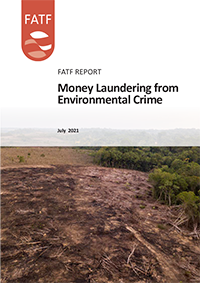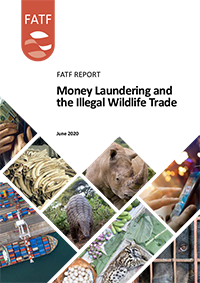 | “UNODC has provided mentoring as well as training on financial investigations linked to environmental crime in Africa, Latin America, Asia, and the Pacific. We will soon launch a new training tool for investigators on the complex linkages in the wildlife crime supply chain.”
Ghada Waly, Executive Director of the United Nations Office at Vienna (UNOV)/ United Nations Office on Drugs and Crime (UNODC) | Ghada Waly UNODC - speech
|
 | “The work FATF is doing is vital in this fight. The fight will be long. It will be hard. But if we work together, we can succeed."
Inger Andersen Executive Director, UN Environmental Program | Inger Andersen -speech
|
 | “The same enforcement tools, techniques and penalties that countries use to combat other serious crimes, such as trafficking in drugs or persons, must be deployed against wildlife crime. (The FATF is) already shifting the needle by assisting our parties to ‘follow the money’ and take the profit out of this crime.”
Ivonne Higuero, Secretary General of CITES, the Convention on International Trade in Endangered Species of Wild Fauna and Flora | Ivonne Higuero - speech
|
 | “In some countries illegal deforestation accounts for up to 90 percent of all forestry activities. In some countries, illegal mining accounts for as much as 90 percent of all the mining activities. We need to have an organised global response in order to reduce and combat and eventually avoid organised environmental crime.”
Espen Barth Eide, Norway’s Minister of Climate and Environment | Watch Speech
|
Transnational crime gangs involved in environmental crimes and wildlife trafficking often commit other serious crime such as drug trafficking, illicit arms smuggling and human trafficking. Under its German Presidency, the FATF has made it a priority to help countries follow the money linked to environmental crimes, to identify and disrupt the organised criminal networks involved.
The conference focused on two themes: (i) how countries and private sector can assess their exposure to financial flows from environmental crimes, and (ii) how countries, international organisations and private sector can work together to combat this threat.
Speakers pointed to the need to prioritise collection of data, anti-corruption efforts and effective implementation of the FATF Standards, including on transparency of company ownership, as key areas for action. While many countries are starting to see progress, such as increased financial intelligence, all speakers agreed that there is a need for continued global focus on money laundering linked to environmental crime. The FATF, UN agencies and other stakeholders must prioritise working closer together and sharing best practice to help the public and private sectors take effective action, speakers agreed.
“The FATF Standards already require that countries criminalise money laundering for a range of environmental crimes and the FATF has added several examples of environmental crimes to the FATF Glossary to clarify for countries the types of offences that fall within this category,” FATF President Marcus Pleyer said at the end of the meeting.
“The FATF will continue to engage and work with its partners to help countries follow the money linked to environmental crime, including through the FATF’s mutual evaluation process (country assessments),” he added. The FATF will report back on the outcomes of this meeting to its members at the next FATF plenary in February 2022.
For more information and interview requests please contact the FATF press team at media@fatf-gafi.org.









 Twitter
Twitter
 Facebook
Facebook
 Instagram
Instagram
 Linkedin
Linkedin
